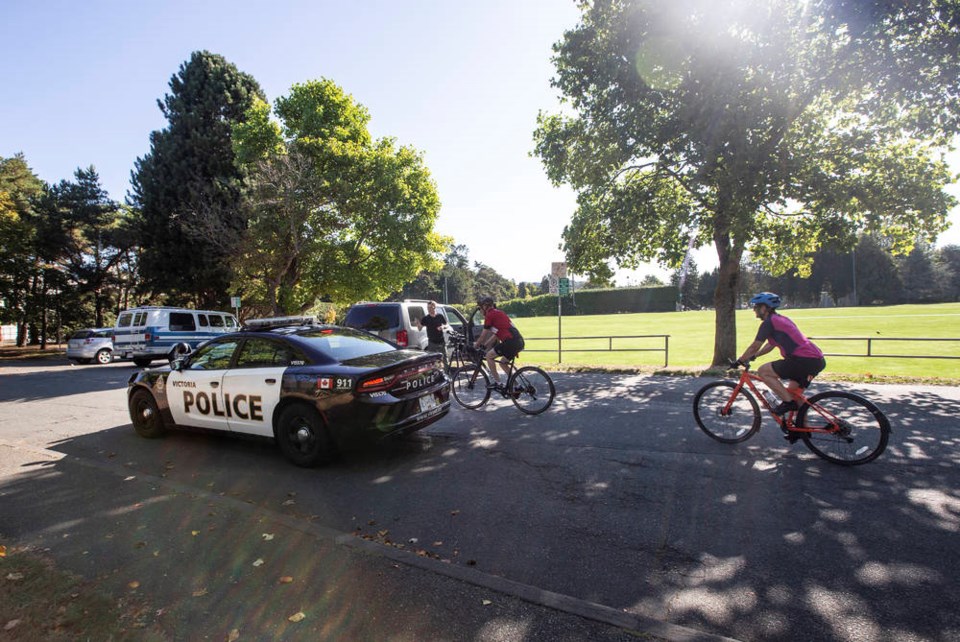Victoria Mayor Lisa Helps is calling for more police resources to keep people safe in city parks where increasing numbers of people without homes are sheltering during the COVID-19 pandemic.
Helps and Coun. Charlayne Thornton-Joe are recommending that council spend $94,500 on a special duty patrol for the last four months of the year.
If approved, the money would cover the overtime costs of deploying two officers for four hours a day, seven days a week from Sept. 11 to Dec. 31.
Helps said the motion will be considered by council Thursday, along with a suite of measures designed to deal with encampments that have sprung up across the city.
A staff report recommends prohibiting camping near schools and in certain parks, limiting shelters to three square metres and requiring structures to be at least four metres apart.
As well, a motion from councillors Marianne Alto and Sarah Potts recommends the city spend $40,000 to canvass people experiencing homelessness for their views on how to better manage the encampments.
Helps said providing the Victoria Police Department with sufficient resources to ensure the safety of the public, city staff and residents of the encampments has to be part of the discussion.
“This is me seeing the effectiveness that the police patrols have had in Beacon Hill and Burnside Gorge,” she said. “With respect to our staff, I think our staff feel safer having the police walking through Beacon Hill Park on a regular basis.”
Helps said “there’s no silver bullet” for solving the ongoing situation in parks where people without homes have taken up residence after shelters reduced available space due to the COVID-19 pandemic. The last of the campers moved from Centennial Square Tuesday, but people who are homeless can still pitch tents in Beacon Hill Park, Central Park and other locations around the city.
“More policing doesn’t solve the problem, engaging with campers doesn’t solve the problem, changing bylaws doesn’t solve the problem,” Helps said. “What solves the problem is getting people inside with the supports that they need — whether it’s just income supports or supports for mental health and addictions — that’s what solves the problem. So all we’re doing right now, along with cities around the country, is managing the problem that pandemic-related homelessness has put on our doorsteps.”
Thornton-Joe said she was happy to second the mayor’s motion. “I know that not only the police department, but all our staff and bylaw [services] are stretched, and there’s definitely a call for more police when it comes to the business community,” she said.
See HOMELESS, page A2
Victoria Police Chief Del Manak said in an interview that without additional resources, his department will be hard-pressed to meet the growing demand for public safety services in and around the parks.
“It’s important to know that the police are there to provide support and safety if and when and where needed,” he said. “We want to be able to do that, but I cannot deliver these extra services with on-duty resources given our call-load demand.
“So the only way that we are able to fulfill our obligation to meeting public safety needs in our parks, and in what we’re seeing happening out on our streets, is really funded through overtime.”
If approved, Manak said the special duty deployment would likely be a mix of foot and vehicle patrols, as officers will have to visit multiple locations in a short period of time.
A key goal will be to protect city staff “so that they can actually help service and provide support for the individuals that are camping in the parks,” he said.
Alto, meanwhile, said it’s important that the city check with people living in the encampments to get their views on how to better manage the situation.
She stressed that the encampments are a temporary measure, with long-term housing as the ultimate goal.
“But right now we’re talking about what do we do in the meantime,” she said. “So if we’re talking about creating guidelines about sizes and numbers and distribution and services and that sort of stuff, what of those things make sense from the perspective of a person who would be needing to be in a sheltering position?”
Alto said it’s crucial that the research be done quickly, so her motion recommends that council provide a grant to the Greater Victoria Coalition to End Homelessness to produce a report within six weeks.
“This is all about trying to find a better way forward right now,” she said. “So, yeah, there’s an urgency to this particular proposal.”
B.C. Housing Minister Selina Robinson acknowledged Tuesday that there is still a lot of work to do to find people homes in the capital region. More than 400 people have been housed at former hotels and other sites in Greater Victoria, but a city report says at least 275 people remain on the street.
“We need to do more on the South Island absolutely,” she said. “I have been working together with the mayors in the South Island, looking to identify land so that we can continue to deliver for the people that need it the most.”
